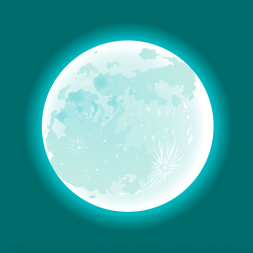Does a Full Moon Really Make Patients Crazy?
Working as a nurse practitioner in the emergency department, I’ve heard many a busy shift blamed on a full moon. A night shift with an abnormally high number of psychiatric patients is likely to be linked to the lunar cycle – in the minds of ER staff, at least. Tonight’s full moon will appear bigger and brighter in the sky than it has in nearly 70 years. So, I’m a little concerned about what this ‘supermoon‘ will cause my shift to look like around 2am. Does a full moon really affect human behavior?
Nurses aren’t the only ones suspicious of human behavior related to lunar cycles. The phenomenon has been studied a number of times and results of such studies published in reputable medical and scientific journals.
Where did the belief originate?
It has long been asserted that the full moon causes strange happenings. The word ‘lunatic’ even has it’s roots in the Latin word for moon, ‘luna’. The Greek philosopher Aristotle, and much later, psychiatrist Arnold Lieber, proposed that the influence of the moon had to do with the human body’s water content. 65 percent of the human body consists of water. So, similar to the ocean’s tides, the moon’s gravitational pull must affect physiological fluid, right?
Long held beliefs about the moon’s affect on mental health are still prevalent. 45 percent of college students believe that humans are prone to unusual behaviors during the full moon, according to Scientific American. A University of New Orleans study says that 81 percent of mental health professionals buy into the theory.
What does science say?
Study after study has debunked the belief that a full moon brings out the crazies. University of Sydney researchers, for example, found no link to the moon’s cycle and violent or aggressive behavior. Authors of another study titled “Much Ado about the Full Moon” published in Psychological Bulletin, found that full moons are entirely unrelated to psychiatric problems, crisis center calls, suicides, and crimes.
As for the theory about the body’s water content and the moon’s gravitational pull? The gravitational effects of the moon are far too small to affect the brain, say scientists. In fact, a mosquito sitting on our arm exerts a more powerful gravitational pull than the moon, says astronomer George Abell of the University of California Los Angeles. Additionally, the gravitational pull of the full moon is just as strong in other lunar phases, and affects only open bodies of water rather than those contained, such as the water content of the body. It’s safe to say that science has debunked the theory that a full moon affects human behavior.
Can you expect an unusual shift in light of tonight’s supermoon?
If the studies surrounding the moon’s patterns and mental health don’t have you convinced, Canadian psychologist Ivan Kelly researched health professionals’ suspicions directly. In a review of over 100 studies of lunar cycles and behavior, including emergency department admissions and suicide attempts, he found nothing suggesting that use of healthcare services was affected by the moon’s orbit.
Why do nurse practitioners feel otherwise?
As a nurse practitioner, you may not be convinced that the science behind behavior and the moon is correct. After all, you recall far too vividly, the chaos of the night shift you worked last month when the moon was at it’s peak. Psychologists believe confirmation bias is to blame for such thinking among healthcare providers. Confirmation bias, selective thinking whereby we seek out information to validate our beliefs and ignore evidence that challenges them, causes us to attribute unusual happenings to the moon, while the behavior of our patients would have been the same regardless.
So, rest assured night shift nurse practitioners. Tonight’s ‘supermoon’ may be an outer space phenomenon, but your workday should maintain status quo.
You Might Also Like: 8 Things NPs Need to Know About the ‘Two Midnight’ Rule

